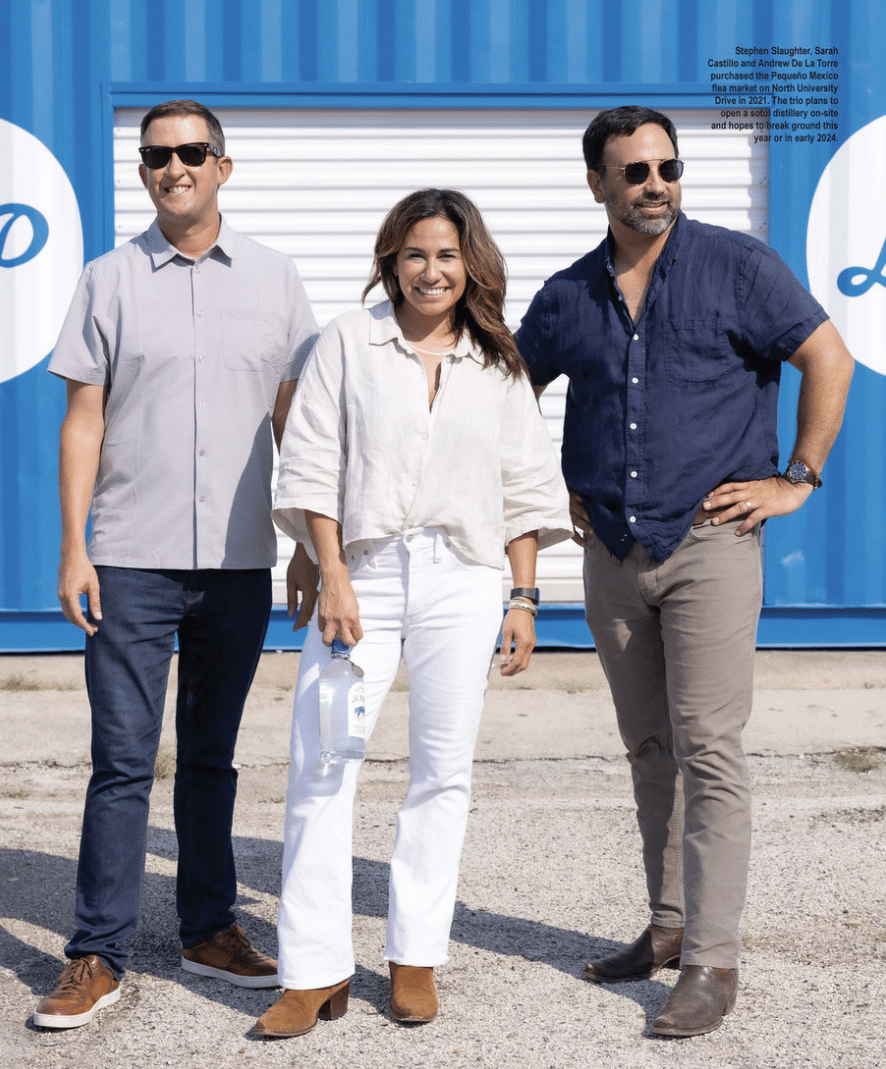
FORT WORTH FLEA MARKET INSPIRES LA PULGA, A NEWLY LAUNCHED TEQUILA
By Tori Couch
Photos by Jill Johnson
Tequila and an open-air market. Those ingredients brought together three Fort Worth entrepreneurs and inspired a new tequila brand, La Pulga Spirits. Sarah Castillo, founder and managing partner of Taco Heads, Tinies Mexican Cuisine and Sidesaddle Saloon; Andrew De La Torre, operator of the Northside’s Pequeño Mexico open-air market; and real estate developer Stephen Slaughter founded the brand and released two expressions — a blanco and a reposado — earlier this year.
The owners pride themselves on offering 100 percent pure agave tequila made in Mexico with no additives, sweeteners or taste enhancers, as certified by Tequila Matchmaker. They want the product to speak for itself, rather than rely on celebrity endorsements or similar marketing tactics.
“We’re very humble, and we like the craft more than the glitzy, showy things,” Castillo said. “We want quality over all that other stuff.”
La Pulga, which means “the flea” in Spanish, is a nickname for an open-air market and honors the brand’s namesake — Pequeño Mexico, an open-air flea market on North University Drive. One of the oldest markets in Fort Worth, it struggled to stay afloat during the COVID-19 pandemic in 2020. Castillo, De La Torre and Slaughter purchased the property in December 2021 with more than 70 investors on board.
“It’s just been kind of a blur since,” Slaughter said. “It took us awhile to go through everything, getting this where we wanted it and getting the bottle how we wanted it, but here we are.”
The brand’s offerings will expand in the near future. An añejo tequila is scheduled to come out this fall, and the group is building a sotol distillery at the market, with plans to break ground later this year or in early 2024.
The plant used in sotol grows in Mexico’s Chihuahuan Desert and parts of the southern United States. Unlike tequila, sotol can be distilled outside Mexico. Tequila must be made in Jalisco, Mexico, using the Blue Weber Agave plant. It takes the agave plant seven to eight years to develop the optimal sugar content for tequila.
Ale Ochoa, a former whiskey scientist at Firestone & Robertson Distilling Co., has been brought on as La Pulga’s head of spirits. Building a small boutique hotel inside the market is part of the trio’s long-term vision.
La Pulga did a soft product release about six weeks before its official launch party, held in late April at the market. Its products are on liquor store shelves throughout Dallas, Fort Worth and Texas.
Several stores in Fort Worth, including Goody Goody Liquor, Kings Liquor and select Total Wine & More locations, carry the tequilas. A store locator on La Pulga’s website shows the full list. The goal is to sell La Pulga in all 50 states, Castillo said.
The tequilas have already received positive feedback from individuals and the industry. VinePair, a digital media company that focuses on wine, beer and spirits, placed La Pulga’s Tequila Blanco on its list of 30 Best Tequilas for 2023 in the under $50 category.
“That was an amazing article to read,” Castillo said. “This is in that category of people that we really, really respect.”
Every decision surrounding the brand, from the distillery site selection to the design of the round bottle, has been intentional.
But it all started at the Fort Worth flea market.
The Northside Pequeño Mexico market has served as a community gathering place for decades.
De La Torre has been involved with the market for 10 years. On the weekends, it is a hub of activity as children run around, vendors haggle with customers over clothing prices and people dance to regional Mexican music, he said.
“We’re doing the brand based off a pulga because of the community that’s involved with it,” De La Torre said.
But the effects of shutdowns from the COVID-19 pandemic led
to vendors leaving. Commercial businesses expressed an interest in repurposing it.
De La Torre thought about ways to preserve the market and its culture. While walking the 12-acre property one day with Castillo, they discovered a mutual desire to get involved in the Mexican spirits industry. Castillo had fallen in love
with the tequila-making process after visiting several distilleries, while De La Torre had considered opening a sotol distillery.
Around that same time, Slaughter had been thinking about starting a tequila company, too. He called Castillo, a friend since high school, not knowing about the conversation she’d had with De La Torre.
“If there’s somebody that can pull off something big and unique in
the community, she’s the person,” Slaughter said.
So the trio began formulating a plan and in August 2021 went under contract to purchase the market. Less than two weeks later, Castillo, Slaughter and De La Torre visited Jalisco, searching for a tequila distillery.
Ultimately, they picked one in the Highlands region. The distillery’s number — 1068 — is marked on a metal coin around the neck of each La Pulga bottle.
The size of the bottles makes them easy to hold, and each label incorporates the cowboy and Western cultures present in Texas and Mexico. A bucking bronco is on
the blanco label, while a bull graces the reposado.
Castillo, De La Torre and Slaughter hope their approach and future endeavors educate customers about the tequila-making process. They also want to honor the industry’s tradition and the workers, whom De La Torre calls “our celebrities.”
“They’re the hardest-working guys I’ve ever met, and I’ve met a lot of hardworking people,” De La Torre said. “We want to give them all the credit they deserve, give the history of the spirit the credit it deserves by doing it the right way, the traditional way, and by respecting the original process and the people who do it.”
